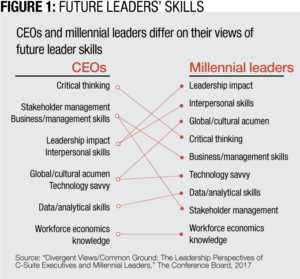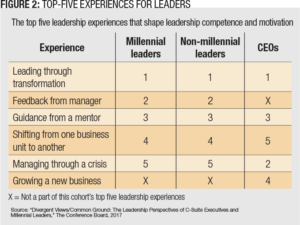 For learning leaders charged with developing leaders who will assume positions of increasing complexity and scope, the task has seldom been more daunting. As leaders find themselves in both a VUCA world — volatile, uncertain, complex and ambiguous — and a BOCA workplace — a workplace characterized by blurred boundaries, an overload of work, complexity and technology addiction — their preparation to lead as well as the mechanisms to support them become critical levers in any organization’s growth and success.
For learning leaders charged with developing leaders who will assume positions of increasing complexity and scope, the task has seldom been more daunting. As leaders find themselves in both a VUCA world — volatile, uncertain, complex and ambiguous — and a BOCA workplace — a workplace characterized by blurred boundaries, an overload of work, complexity and technology addiction — their preparation to lead as well as the mechanisms to support them become critical levers in any organization’s growth and success.
Demographic tipping points are already here. Baby boomers continue to exit the workplace, and those in Generation X are too few in number to fill all open positions. Millennials are assuming significant leadership roles, sometimes at a pace faster than they and the organizations they serve would otherwise embrace. Indeed, the millennial generation — one of the most globally connected and diverse in U.S. history according to 2015 census data — working in global multinationals, regional powerhouses and local firms, are rapidly approaching 50 percent of many organizations’ workforce. In many technology and financial services firms, they have already crossed that line. Senior leaders in these organizations recognize and are proactively looking for a response to millennials’ growing influence and impact. Research offers a few actionable options.
How leaders are best developed was a focus of leadership development research conducted by Development Dimensions International and The Conference Board’s “Global Leadership Forecast 2014/2015.” Leadership, particularly millennial leadership, was also the focus for a research study The Conference Board conducted in partnership with RW2 Enterprises, “Divergent Views/Common Ground: The Leadership Perspectives of C-Suite Executives and Millennial Leaders,” released in January.
Identifying, selecting, preparing and supporting long-term success for leaders of any generation is challenging. Leaders have to succeed, and they must grow into the kinds of leaders an organization will need in the future, even when the future is viewed through a murky glass. What kinds of leaders are millennials, who might they become, and what imperatives might drive their choices, if their values are different? What leadership attributes will they embrace, and how might they best be developed? Every generation leaves its mark. Will the millennials lead differently once the inevitable demographic tilt is complete?
Trendy, popular headlines about millennials and their impact should be taken lightly. Each of-age generation has been the recipient of disparaging commentary by its elders at least since Aristotle. Defensible, quantitative research about millennials is rare, however, and research about millennial leaders is even more so.
Learning leaders need to better understand which differences — if there are any — are attributable to generational, life-stage or leader-level differences; in which case, changes would be roughly similar for leaders of any generation. In spring and summer of 2016, the “Divergent Views” research conducted interviews, focus groups and surveys with chief executive officers, members of their C-suite teams as well as their millennial leaders to understand leadership now and what leadership is needed. Respondents answered questions about their leadership journeys, how they developed and the values they held that shaped them as leaders. The study also surveyed and interviewed those responsible for developing leaders about what they do and, perhaps, do differently.
Fourteen organizations participated: Aetna, American Express, athenahealth, Boeing Co., Cardinal Health, Humana, Johnson & Johnson, Kindred Healthcare, KPMG, Teachers Insurance and Annuity Association of America, United Rentals, UPS, Verizon Communications, and Xerox. In addition to the 14 CEOs, more than 2,800 leaders at various stages in their careers and of different generations participated in the study.
Will Future CEOs Be Different?
The study asked leaders at all levels, including CEOs, for their views on what skills future leaders would need to be successful. Their responses suggest that millennial leaders will certainly reshape the CEO role. CEOs and millennial leaders paint distinctly different profiles of an ideal future senior leader. Each selected a different set of skills for success (see Figure 1).
For millennial leaders, the prototypical leader is an inspiring coach, a compelling communicator and one whose choices and actions are informed by an intercultural perspective. Their future CEO leads and succeeds globally through interpersonal skill and has an inclusive decision-making style versus “command and control.” One millennial leader focus group participant said, “You don’t tell people what to do, you empower them.”
By contrast, CEOs’ ideal future leader focuses less on interpersonal influence and more on efficient decision-making and business savvy. Also critical to CEOs was skill in stakeholder management, such as board members, shareholders, regulatory agencies and media. This disparity may reflect the leader level more than generational cohort as the millennial leader exposure to stakeholders may be more limited.
How Do Millennial Leaders Grow?
A mix of experience, education and exposure drive growth, but that road map may not match the traditional path for leaders. Research participants selected five experiences (from a list of 14) that are likely to drive a successful journey to top leadership positions. CEOs and C-suite leaders could speak to what helped them the most in the past; others, including millennial leaders, could respond with what they thought would help them most as they look forward (see Figure 2).
 There was full agreement on the top spot, “Leading Through a Strategic or Cultural Transformation” as well as on the No. 3 spot, “Guidance From a Mentor.” Interviews revealed numerous examples on the importance of mentorship. One millennial leader said all four of his promotions were due to mentors who were able to show him “what it takes to be a leader, to find his core values.” One CEO talked about an early experience as an executive assistant to a past chairman and CEO who served as a key mentor for a nine-month experience. “You learned that you can’t do everything yourself. The job is about them, not about yourself.”
There was full agreement on the top spot, “Leading Through a Strategic or Cultural Transformation” as well as on the No. 3 spot, “Guidance From a Mentor.” Interviews revealed numerous examples on the importance of mentorship. One millennial leader said all four of his promotions were due to mentors who were able to show him “what it takes to be a leader, to find his core values.” One CEO talked about an early experience as an executive assistant to a past chairman and CEO who served as a key mentor for a nine-month experience. “You learned that you can’t do everything yourself. The job is about them, not about yourself.”
Millennial leaders and non-millennial leaders agreed 100 percent on the top five experiences in order of importance. Then ideas began to diverge. CEOs were the only ones to select, “Growing a New Business” as a critical experience, and placed greater value on “Managing Through a Crisis.” In focus groups, the impact of crisis came up often; their perspectives and resilience changed within the context of a business crisis or through a personal one, like a serious illness or the loss of a loved one.
Part of this difference can be explained by experience. Most CEOs have spent several decades as leaders and, during their careers, they likely have had exposure — purposeful or not — to a greater and more strategic variety of experiences, not to mention the natural course of experiences gleaned from simply living. This raises the question, how can early-career leaders — of any generation — gain exposure to the high-stakes experiences that mold CEOs most?
How Can Organizations Develop the Next Generation of Leaders?
The research asked leaders as well as those responsible for leadership development programs about the frequency and effectiveness of a variety of programs and approaches. There was little difference among the groups. Developmental assignments were at the top of the list. Several leaders commented on the value of multiple assignments. Coaching from current managers placed second in terms of high-effectiveness/high-frequency development activities. Coaching from internal coaches/mentors was of relatively high value for both leadership groups.
Organizations can do a much better job of formalizing the coaching process, however, especially for early-career leaders. In today’s information-rich and constantly changing business environment, a network of coaches and mentors for early-stage leaders is likely to have a high payoff.
Formal workshops and training still carry a relatively high value and are used somewhat frequently. One millennial leader praised her company’s early-leadership career program, as it helped her learn how to expand her network and provided opportunities to learn from other managers.
Low on the list was self-learning or mobile learning; surprising for a generation reliant on technology, but this may indicate that when “on your own” learning programs go too far and disconnect a leader from chances to practice, receive feedback, and engage in shared learning experiences with peers, the learning payoff simply isn’t there. When it comes to leadership, social interaction is an important facet of the learning environment.
In many ways, millennial leaders aren’t that different from other generations or from CEOs. All leaders recognize the formative power of mentorship and growth through transformation, and they value development assignments, coaching, and formal learning while viewing self-study learning as unproven as a primary learning method.
However, there were exceptions — particularly when both CEOs and millennial leaders looked over the horizon at future leaders’ needs. Overall, learning leaders should carefully consider the common ground before deferring to oft-overstated differences among the generations. Research shows that learners grow through similar methods and means, even if the skills they are growing appear to be shifting.
Rebecca Ray is executive vice president at The Conference Board. Evan Sinar is chief scientist and vice president at Development Dimensions International. Comment below or email editor@CLOmedia.com.














